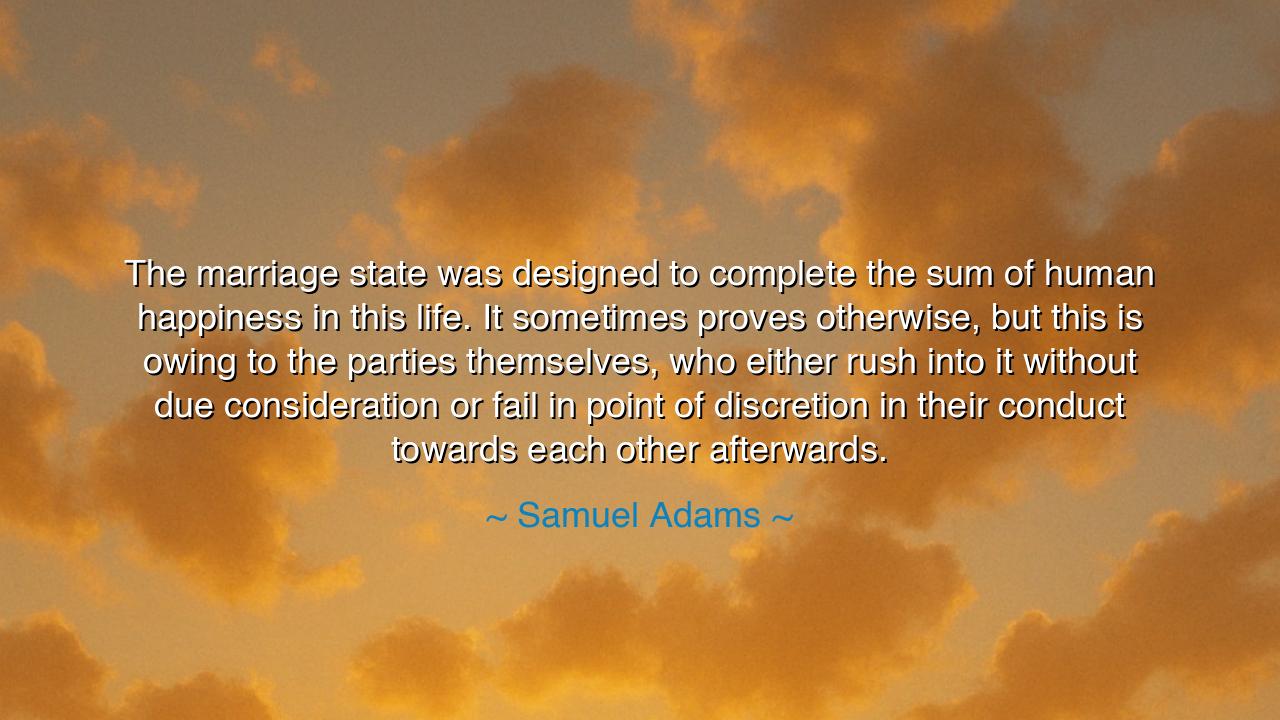
The marriage state was designed to complete the sum of human
The marriage state was designed to complete the sum of human happiness in this life. It sometimes proves otherwise, but this is owing to the parties themselves, who either rush into it without due consideration or fail in point of discretion in their conduct towards each other afterwards.






In the words of Samuel Adams, “The marriage state was designed to complete the sum of human happiness in this life. It sometimes proves otherwise, but this is owing to the parties themselves, who either rush into it without due consideration or fail in point of discretion in their conduct towards each other afterwards.” These words, though written in the measured tones of an eighteenth-century statesman, carry a timeless wisdom — that marriage, that sacred bond of two souls, was not meant to be a burden or a battlefield, but a vessel for human happiness, a sanctuary of shared purpose and love. Yet, Adams reminds us, when this divine union falters, it is not because of fate or misfortune, but because of the folly and haste of human hearts. The blessing of marriage is eternal; its ruin, man-made.
The origin of this quote lies in Adams’s deep belief in virtue and self-discipline — the same qualities that guided him as a revolutionary leader and thinker. Living in a time when marriage was seen as both a social contract and a spiritual covenant, Adams regarded it as the highest earthly institution for cultivating moral character and happiness. But unlike the idealists who painted marriage as effortless harmony, he saw clearly that it demanded consideration, patience, and discretion — the same virtues that sustain liberty and peace in the body politic. Just as a republic cannot thrive without wisdom and virtue, so too a marriage cannot endure without self-restraint and understanding.
His insight speaks to a truth that transcends centuries: that love, though divine in origin, must be guided by reason. The ancients echoed this same truth in their own words. The philosopher Aristotle taught that friendship — the truest form of love — requires both affection and deliberation, for passion without prudence burns bright and dies quickly, while love grounded in wisdom endures like the sun. Adams, a man of reason and faith, understood that marriage, like all noble institutions, must balance the heart’s fire with the mind’s judgment. It is not enough to fall in love; one must also learn to stand in love — to tend it with care, to shield it from pride, impatience, and neglect.
Consider the story of Marcus Aurelius, the philosopher-emperor, who once wrote to his beloved wife, Faustina: “When I return from the field, I find peace in you.” His words show that even amid the storms of empire, he found solace in the harmony of his marriage. Yet many of his peers, consumed by power or vanity, destroyed their own unions through cruelty or disregard. The difference was not destiny, but conduct — the daily choices of kindness, humility, and attention. So it is with all human bonds. Happiness in marriage is not a gift bestowed once and for all, but a creation renewed with every act of care.
Adams’s warning against those who “rush into it without due consideration” remains ever relevant. In every age, people mistake passion for permanence, ceremony for connection. They seek in marriage a remedy for loneliness, a balm for ego, or an escape from themselves — forgetting that one cannot find completion in another without first being whole in spirit. To enter marriage without reflection is to build a temple on sand, for when the storms of life come, love unexamined will not stand. Discretion, the second virtue Adams praises, is the wisdom to govern oneself within the bond — to speak with gentleness, to forgive with grace, to yield with dignity. Without such discretion, love turns from a haven into a prison, and happiness gives way to resentment.
The power of this quote lies in its balance between idealism and accountability. Adams does not abandon the hope that marriage was designed for happiness, nor does he excuse its failures as inevitable. Instead, he places the responsibility squarely upon the partners — a call to moral maturity. In this, he speaks as both philosopher and patriot, for the harmony of marriage mirrors the harmony of nations. Just as freedom demands vigilance, so does love demand effort. Both crumble when neglected, and both flourish when rooted in virtue.
The lesson, then, is clear: marriage is both gift and labor. It is not happiness handed to us, but happiness we must build together. Those who seek to marry should do so not in haste, but in reverence — weighing the character of their partner, and their own. And once joined, they must practice the art of discretion: to listen more than they speak, to heal more than they wound, to love not only in the warmth of spring but through the winters of the soul. For those who live this way, the “sum of human happiness” becomes real — not as fleeting passion, but as enduring peace.
So remember, O listener: love is divine, but its keeping is human. The bond of marriage was made to complete our joy, but its success rests not in fate, nor fortune, nor ceremony — only in the daily practice of patience, respect, and compassion. As Adams teaches, those who honor love with both heart and reason will find in their union the truest reflection of heaven on earth.






AAdministratorAdministrator
Welcome, honored guests. Please leave a comment, we will respond soon